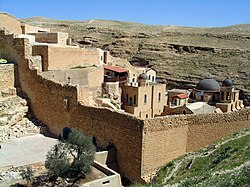This is an old revision of this page, as edited by Jaakobou (talk | contribs) at 23:11, 31 January 2008 (he). The present address (URL) is a permanent link to this revision, which may differ significantly from the current revision.
Revision as of 23:11, 31 January 2008 by Jaakobou (talk | contribs) (he)(diff) ← Previous revision | Latest revision (diff) | Newer revision → (diff)31°42′18″N 35°19′52″E / 31.705°N 35.331°E / 31.705; 35.331



Mar Saba (they) is a Greek Orthodox monastery overlooking the Kidron Valley in the Judean desert (Israel). It was founded by Saint Sabas of Cappadocia in the year 439. While it currently houses only 20 monks, during the 7th century it may have held as many as 4000. It is considered to be one of the oldest inhabited monasteries in the world, and still maintains many of its traditions. One in particular is the restriction on women entering the main compound. The only building that women can enter is the Women's Tower, near the main entrance.
The monastery has well preserved remains of a body believed to be Saint Saba. Mar Saba is occasionally referred to as the Convent or Monastery of Santa Saba (cf. Incidents of Travel in Egypt, Arabia Petraea, and the Holy Land (1837) by John Lloyd Stephens).
Mar Saba was also the home of St. John of Damascus (b.676 - d.749-754?) St John the Damascene was a key religious figure in the Iconoclastic Controversy, who in ca. 726 wrote letters to the Byzantine emperor Leo III the Isaurian refuting his edicts prohibiting the veneration of images or statues of Christ or other Christian icons. John who was born in Damascus and worked as a high financial officer to the Muslim Caliph Abdul Malik, eventually felt a higher calling and migrated to Palestine, where he retired and was ordained as a priest at the Monastery of Mar Saba. St. John's tomb lies in a cave under the monastery. (See St. John of Damascus)
Mar Saba is where Morton Smith claimed to have found a copy of a letter ascribed to Clement of Alexandria containing excerpts of a Secret Gospel of Mark.
Notes
- According to the head of the monastery today, the monastery never housed more than 100-200 people at one time. Perhaps the former figure refers to the amount of cave hermits that were found in the hundreds of caves nearby, one of which belonged to Saint Sabas himself. Template:Link FA